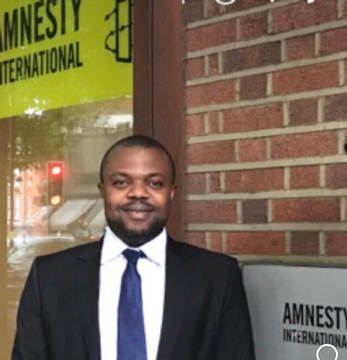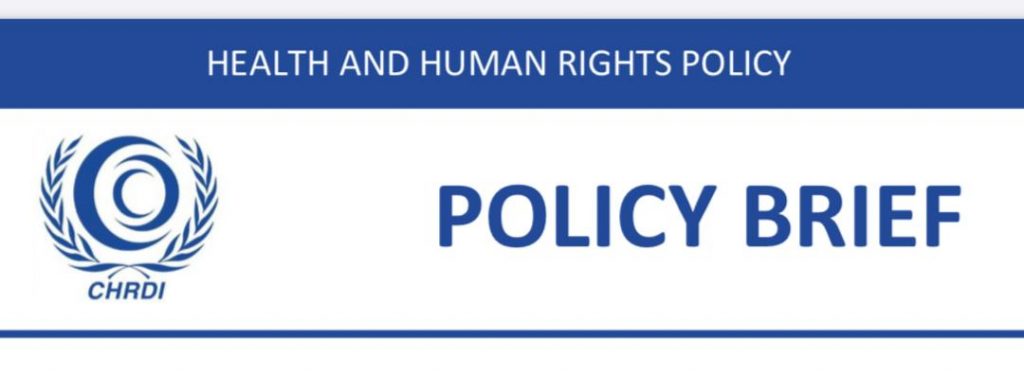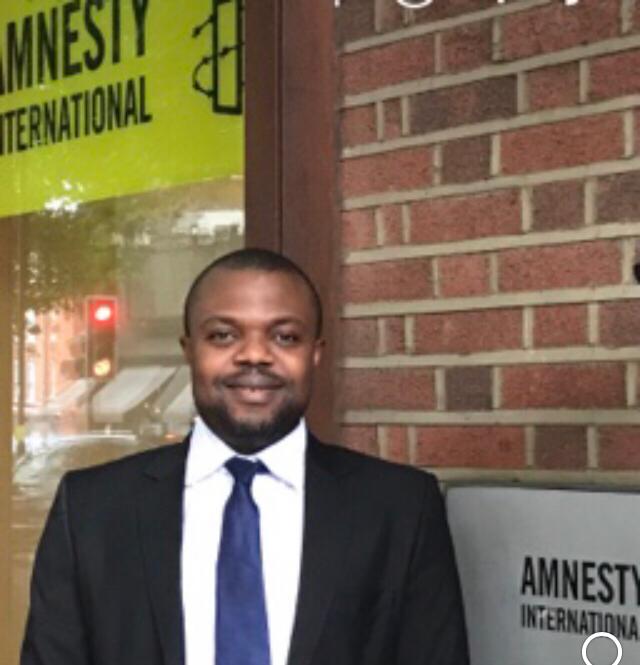
August 20, 2020
Health and Human Rights Policy
By Campaign for Human Rights and
Development International (CHRDI)

The health system can promote or violate human rights in the way it is designed and implemented, that is (accessibility to service, provision of information, respect for integrity and privacy, cultural sensitivity, gender and age sensitivity).
The World Health Organization was founded on the principle that all people have the right to the highest attainable standard of health. You could say that “Health for all” is in our DNA. We at CHRDI believe that Health is a human right and should not be denied based on any factor, including gender, ethnicity, or socioeconomic status. In Sierra Leone the Ministry of Health & Sanitation (MOH&S) is the government department responsible for the delivery of health care services in the public sector. Government hospitals are located in Freetown and the larger population centers of the country. Health care services at district level are currently provided by peripheral health units (PHUs) overseen by the District Health Management Team headed by the District Medical Officer who is responsible for managing public health activities in the district. PHUs are the delivery points of Primary Health Care in the communities across the country. MOH is responsible for the overall formulation of national health policy and the supervision of health facilities, among other functions.
In order to satisfy patients, practices have to keep up with the latest technological advances and training of staff or suffer the consequences.
The challenge is to negotiate the optimal balance between promoting and protecting public health and promoting and protecting human rights. In order to accomplish this aim, it would be necessary that Government allocate their national health policies, laws, programs and practices to national and international human rights instruments.
Inspiration for the core content of the right to health derived from the Health for All and Primary Health Care strategies of the WHO, which stipulates that ‘there is a health baseline below which no individual in any country should find themselves’. Thus, irrespective of their available resources, states should provide the following basic services:
- Access to maternal and child health care, including family planning.
- Immunizations against the major infectious diseases.
- Appropriate treatment of common diseases and injuries.
- Essential drugs.
- Adequate supply of safe water and basic sanitation.
- Freedom from serious environmental health threats.
In addition to the scope of core content, a number of guidelines constitute the framework of the right to health:
- Availability of health services.
- Financial, geographic and cultural accessibility of health services
- Quality of health services; and
- Equality in access to available health services.
The healthcare problems in Freetown range from inadequate policy monitoring, mistreatment of patients, shortage of drugs and medical supplies in public health institutions, poorly equipped health centers, lack of labs, lack of modern medical equipment, scattered storage facilities for drugs, to proliferation of poorly constructed health center’s with no water facilities.
The Connaught hospital hosts 45 medical doctors on a rotating worker ratio, 8 Doctors per day, and 875 nurses; out of this number only 300 nurses are pin coded and Connaught hospital singularly admits about 800 to 900 patients per day. The patient population is far beyond the available staff.
Our team discovered delays in service delivery: In some hospitals and health Centre’s across Freetown, patients/clients wait for incredibly long hours before receiving medical attention.
We also observed massive congestion and an inadequate number of nurses attached to each ward.
At the outpatient’s department, there is a culture of laissez faire and corruption by nurses and paramedical staff who often turn down appeals to treat dying patients because they cannot pay bribes.
Nurses at the Ear, Nose and Throat Department including the Eye Clinic, it is alleged, collect money from patients before issuing them registration cards and deceive people into believing that it is a normal and legal practice.
The Intensive Care Unit, where sick people rely on electricity for their survival, often experience power cuts and the standby generator is often without fuel. Our findings also show that the hospital relies on outside sources for water supply. The water facility within the hospital complex is not sufficient.
We also observed that there is some improvement in the Emergency and Accident Unit, which a British charitable organization called Kings Sierra Leone Partnership had managed few years ago.
The charity brought in some advanced equipment.
The government wants to see more people come to its facilities, but this will require a fundamental shift in thinking. As it stands, doctors, nurses, and other healthcare providers are not held accountable for a lot of their actions, e.g., medical negligence. There are systems of accountability in Sierra Leone that could be powerful, but they are few and far between. To improve health outcomes, the government needs to improve on the actual quality of care by focusing on the performance of staff, the supply of medicines and the quality of infrastructure. However, the Ministry of Health and Sanitation is one of the largest ministries of government in terms of its budgetary allocations and operational activities.
Policy Motivation
MOHS is responsible for the overall formulation of national health policy and the supervision of health facilities, among other functions in Sierra Leone. Besides the legally binding Human Rights instruments there are several international documents with relevance for the interpretation and understanding of human rights in relation to health.
These are declarations, recommendations, plans of action, etc., which governments have agreed on (but they are not part of the legal system.
We further investigated into the legal framework regulating health and sanitation in Sierra Leone revealing a surfeit t of laws covering the subject, many dating back to colonial days. Some from that period still remain on the Statute Books while others have been updated and revised to take account of more modern practices and developments during the intervening period.
Some of the main legislative instruments currently covering health and sanitation and impacting on the activities of the Ministry are:
- The Public Health Ordinance 1960
- The Pharmacy and Drugs Act 2001
- The Medical Practitioners and Dental Surgeons Act 1996
- The Nurses Ordinance (CAP 152)
The right to health has been included in a number of human rights treaties. At the UN level, the provisions of several instruments deal with the right to health. The main ones are Article 25 UDHR; Article 12 ICECSR; Article 12 CEDAW; Article 24 CRC; Article 5 CERD; Article 28 CMW; and Article 25 CRPD.
The Republic of Sierra Leone 1991 Constitution echoes this in CHAPTER II – FUNDAMENTAL PRINCIPLES OF STATE POLICY (Fundamental obligations of Government) Section 8-2B, which says, “The State shall recognize, maintain and enhance the sanctity of the human person and human dignity”. This means that there should be adequate medical and health facilities for all persons.
Article 12 ICESCR states that everyone has the right to ‘the highest attainable standard of physical and mental health’. Article 12(b) identifies four steps the state has to take in order to promote conditions in which people can lead a healthy life. These include, inter alia, the improvement of environmental hygiene, preventive health care and the prevention of occupational diseases. Thus, Article 12 ICESCR acknowledges that the right to health includes a wide range of socioeconomic factors which are underlying determinants of health, such as food, housing, potable water, safe and healthy working conditions, as well as a healthy environment.
Article 12 CEDAW stipulates the right to health care of women. The text focuses on equal access to health care facilities for women. Pre- and post-natal care are specially emphasized in the second paragraph, services which states parties are to provide for free. Article 11(1)(c) CEDAW refers to ‘the right to protection of health and safety in working conditions. Article 14 CEDAW deals with the situation of rural women. According to paragraph 2(d), states shall ensure that rural women have ‘access to adequate health care facilities, including information, counselling and services in family planning’. The text in this Convention is narrower than Article 12 ICESCR in that it only refers to health care services and not health-related issues.
Article 24 CRC contains an elaborate provision on the right to health of children. Similar to Article 12 ICESCR, it recognizes the right to ‘the highest attainable standard of health’ of children. The article is broader than Article 12 CEDAW in that it refers not only to a right to health care facilities, but also to adequate food, drinking water, environmental health, access to information and prohibition of traditional harmful practices.
Article 5(e)(iv) CERD establishes the right of everyone to enjoy, without distinction as to race, color, or national or ethnic origin, inter alia, the right to public health and medical care.
Article 27 CMW requires states parties to provide emergency medical care to migrant workers and members of their families.
Article 25 CRPD mandates non-discriminatory treatment and specialized services for disabled people. The Convention requires early intervention and treatment of disabilities, and further, that health facilities be as close as possible to the communities of disabled people.
Policy Impact
Human Rights have implications for public health and health services in many ways. They recognize the right of the individual to access to health services and the obligation of the government to fulfil this by making health services available to all. They include underlying determinants for health, as the right to housing, food, water, healthy occupational and environmental conditions etc. They are important in guiding how public health activities are implemented, so as not to violate the rights of the individuals. By offering adequate health services human rights will be protected and promoted in the community and by respecting human rights principles in the health services dignity and wellbeing of the individual can be restored.
Public health policies are population oriented. Because individual health – for example, whether one is vaccinated or infected, a smoker – affects the health of others. Public health measures regulate individual behavior in order to achieve population health goals. Such policies apply broadly and are not tailored to specific individual circumstances.
In human rights and public health policy, the key question is not just what works, but what works for whom, in what circumstances, and in what ways? Research and evaluation that help answer these questions can assist with the development of appropriately considered policies, thus supporting the creation of a more level playing field in the political marketplace, allowing for a more balanced set of voices to be heard in the political process of policy making.
The differences between the two worlds of researchers and policy makers are often cited as providing obstacles preventing research from being taken up into policy making. In response to this problem, infrastructures to promote knowledge transfer and capacity building to bridge the gap between these two communities is increasingly being put into place within and between institutions.
Health concerns all of civil societies and so social, economic, cultural, political, and ethical considerations do influence agenda setting, policy formation, and implementation to varying degrees. Therefore, seeking an evidence base for public health policy may mean taking into account many different forms of evidence, in addition to evidence of efficacy and effectiveness.
Audience
The primary target audience for this brief is policymakers, planners, and managers responsible for health workforce policy and planning at national and local levels. Secondary target audiences include development partners, funding agencies, global health initiatives, donor contractors, researchers, civil society organizations, and community stakeholders.
Policy Implications
Human Rights have implications for public health and health services in many ways. They recognize the right of the individual to access to health services and the obligation of the government to fulfil this by making health services available to all. They include underlying determinants for health, as the right to housing, food, water, healthy occupational and environmental conditions, etc. They are important in guiding how public health activities are implemented, so as not to violate the rights of the individuals.
By offering adequate health services human rights will be protected and promoted in the community and by respecting human rights principles in the health services dignity and well-being of the individual can be restored.
In this perspective, we seek first to explore the development of human rights under international law and the implementation of health-related human rights through public health policies at local level. We then examine the contemporary operationalization of human rights in public health efforts, through which human rights standards seek to provide normative clarity in health policy and legal accountability for public health outcomes.
Implementation
Law and policies have had important contributions to several public health achievements but, despite this, the conceptual framework for its effective application has not been fully explicated.
Our recent research into the Health Sector shows that there is stagnation in the growth and development of administrative staff, disregard for policy and authority and poor work ethics among frontline health workers.
In the case of Coronavirus cases in Sierra Leone and the world over, policymakers have sprung into action-more information is being disseminated about preventive measures such as hand washing and not touching the face.
Social distancing has been suggested as a tool to “flatten the curve” or in other words, prevent the health system from being overburdened. Although the Covid-19 cases are somehow low in Sierra Leone, experts have warned against community spread of the disease, which will lead to rapid and huge increase in demand for health facilities. Private healthcare is expensive and unavailable for almost all poor households in Sierra Leone, which leaves public healthcare facilities as the only option for them. For patients who are found to be COVID19 positive, isolation wards are needed; additionally, for critical cases, intensive care is needed. Currently, almost all suspected cases of Coronavirus are referred to government hospitals and it’s important to assess where the country stands in terms of medical capacity to provide necessary healthcare to affected individuals.
We at CHRDI believe that it behoves us to bring the following to light and urge the Government of Sierra Leone to take the necessary steps to address them and fast. It is not enough for any government to merely assert they are doing what is necessary.
Produced by; CHRDI

Campaign for Human Rights and Development International (CHRDI), a Rights based social-policy advocacy Organization.
We draw attention to the responsibilities of duty-bearers to uphold human rights and seek to support rights-holders to claim their rights. CHRDI is in Special Consultative Status to the United Nations Economic and Social Council and accredited to many UN Agencies.



